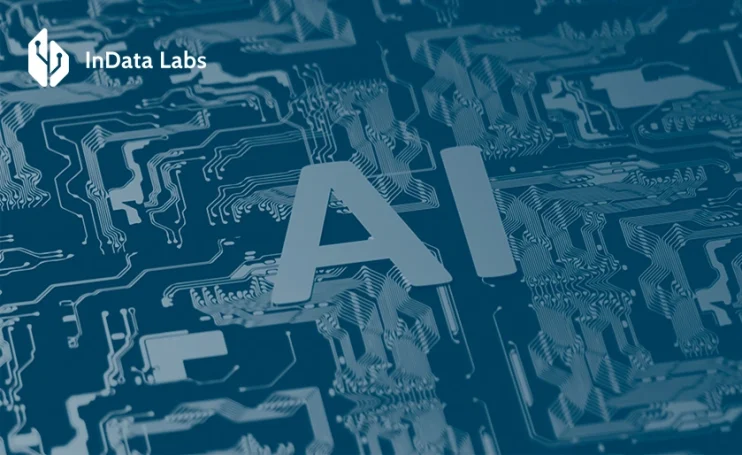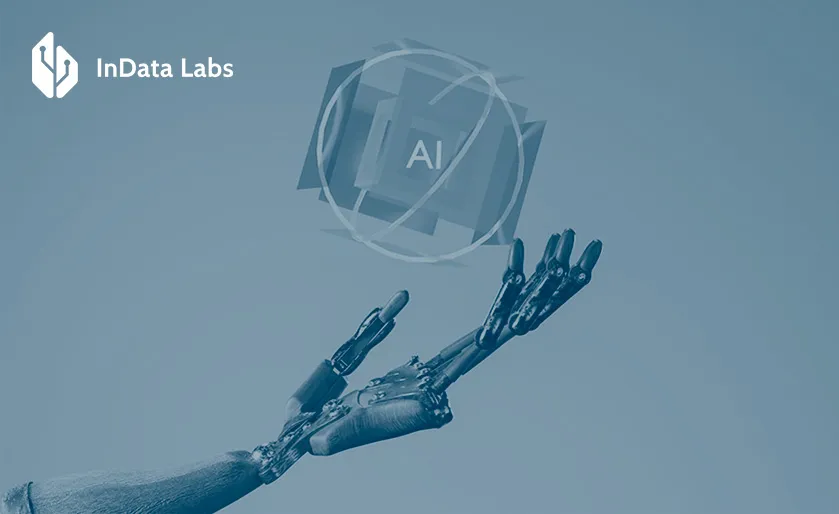Generative artificial intelligence is rapidly changing the tech picture of various industries. Generative AI use cases by industry show that it has ceased to be a futuristic concept and has become a real tool for achieving competitive advantages.
Generative AI industry use cases
In this article we will consider numerous generative AI use cases across industries and how AI business solutions transform different companies, making possible what previously seemed impossible.
Healthcare
The society is observing spikes in GenAI healthcare use cases. Generative artificial intelligence is actively being introduced into diagnosis, treatment, and research solutions.
First, it helps accelerate drug development. For example, Insilico Medicine uses AI to create new molecules and optimize existing drugs. They successfully developed a new drug in just 46 days, much faster than traditional methods.

Source: Unsplash
IBM Watson Health and Tempus use AI tools to process large volumes of medical data, analyze it, and create personalized treatment plans. This allows companies to uncover hidden patterns and improve the effectiveness of the therapy.
One more generative AI use case in the healthcare industry is Mayo Clinic. It has collaborated with Google Health to analyze medical images, particularly in radiology. The models can interpret medical scans with high accuracy and detect diseases like cancer at earlier stages, especially in complex cases where human radiologists might miss subtle signs.
Among other well-known GenAI use cases in healthcare is Johns Hopkins Medicine, a leading health system and academic institution. Its AI models generate realistic simulations of complex surgeries and even enable surgeons to perform AR surgeries, improving patient outcomes.
Manufacturing
Generative AI use cases in the manufacturing industry span numerous purposes, helping optimize processes, improve product quality, and develop future-proof solutions.
For instance, Bosch leverages AI models equipped with predictive analytics to analyze data from production lines and predict possible equipment failures. As a result, the company can perform preventive maintenance promptly, which increases production efficiency and reduces repair costs.
Mitsubishi Electric also uses predictive GenAI models to optimize supply chains, find the most efficient delivery routes, and forecast demand. This, in turn, reduces costs and improves inventory management.

Source: Unsplash
In addition, generative AI applications can automate many aspects of production, as observed in BMW factories, where GenAI apps optimize production processes. The company uses the technology to automate tasks such as production planning, resource allocation, and quality control, which can increase productivity and reduce errors.
Foxconn, one of the largest electronics manufacturers, uses GenAI to identify defects on the production line and control product quality. Detecting the smallest defects at a level that is inaccessible to the human eye, AI allows the company to identify and eliminate problems promptly.
Other examples of generative AI industry use cases include Airbus and General Electric (GE), which adopted GenAI tools to create more efficient products and designs for aircraft. In one of these projects, GE managed to reduce the weight of the fuel nozzle by 25% while maintaining its reliability and functionality.
Oil and gas
Generative AI use cases in the oil and gas industry keep growing as they help companies solve complex problems related to mining, processing, and transportation.
For example, ExxonMobil’s tool uses AI to process seismic data and model the Earth’s subsurface, allowing geologists to find potentially productive sites for drilling and accelerate the processes of exploring new oil and gas fields. Other GenAI use cases in oil and gas industry include Shell, which predicts potential scenarios for well drilling. It analyzes the data in real time and offers optimal drilling parameters, which allows for reducing risks and expenses.
BP has implemented a GenAI-based system that analyzes data from equipment sensors on oil platforms and predicts possible malfunctions. This enables the company to perform preventive maintenance on time and avoid production downtimes. One more energy company Equinor started using predictive AI to plan and optimize oil and gas transportation routes, which allows it for lower costs and faster delivery of products.

Source: Unsplash
Generative AI is also applied in the automation of oil and gas processing. A good example is Chevron, which uses it to automate and optimize processes such as pressure, temperature, and material consumption management.
Some oil and gas companies, like Eni, made use of generative AI industry use cases to reduce environmental risks and monitor environmental impact. The models help Eni monitor greenhouse gas emissions and oil spills and allow it to react promptly to possible environmental threats.
Telecom
We are moving on to generative AI use cases in telecom industry that serve numerous purposes for businesses. Orange follows the trends and implements GenAI into its marketing strategies. The system automatically generates advertising materials and offers for different customer segments based on their behavior and preferences.
AI chatbot implementation service has been the most valuable so far, as AI chatbots can handle customer requests, generate responses, and solve standard and complex problems without agent involvement. Vodafone launched a chatbot and managed to significantly reduce the load on customer service agents.
AT&T telecom company uses predictive AI to analyze abnormal patterns in user data and network traffic, which allows it to quickly detect suspicious activity and prevent fraud. Meanwhile, BT’s AI tools generate recommendations for the repair and optimization of network equipment. This enables engineers to react faster to problems and minimize network downtime.
Automotive
The technology has also been widely implemented in the automotive sector. Generative AI use cases in automotive industry range from design and manufacturing to improving user experience and autonomous driving.
The first generative AI case study is General Motors’ tool for developing new automotive components. With the help of AI-based systems based on Autodesk, GM created a new seat support structure that is 40% lighter and 20% stronger than the traditional one.
Waymo is another automotive company that adopted the tool. It is designed to model road traffic scenarios and train their autonomous cars, which significantly accelerates the learning process and increases car reliability.

Source: Unsplash
One more GenAI application is optimizing production processes and forecasting possible problems on the production line. This is what BMW implemented the tool for and, as a result, reduced downtime risks and improved overall production efficiency.
The technology comes in handy for creating a more tailored in-car experience for drivers and passengers. For instance, Audi has incorporated generative AI to enhance the functionality of its virtual cockpit and infotainment systems. Their system can learn from driver behavior to adjust seats, mirrors, music playlists, or navigation routes.
Retail & marketing
An abounding number of generative AI use cases in retail industry prove how invaluable the technology has become for many retail business owners. The most widespread GenAI use cases in retail are AI chatbots for tailored customer service. We can mention H&M, which launched a chatbot that helps to find the items customers need, provides recommendations based on preferences, and answers questions on item availability and delivery.
Meanwhile, Alibaba uses generative AI to automatically generate product descriptions on its platforms, such as Tmall and Taobao, and increase conversion. This technology allows employees to create unique and detailed descriptions that help buyers better understand the product’s properties and benefits. In addition, the company managed to dramatically optimize its digital advertising campaigns with the help of AI tools.

Source: Unsplash
Zara, known for its fast response to fashion trends, uses GenAI to forecast demand and optimize supply chains. This helps the company stock up on its most popular products on time and reduce unsold inventory. One more company whose inventory benefited from Generative AI is Target, which incorporated AI systems for managing inventory and logistics more efficiently.
Walmart also uses the predictive analytics capability of artificial intelligence to analyze real-time data and offer competitive prices that attract customers and maintain optimal profit levels. Amazon’s neural networks analyze data about purchases, views, and actions of customers on the site to create personalized product recommendations and increase the likelihood of a purchase.
Besides product descriptions and recommendations, GenAI systems can generate new product ideas. PepsiCo seized the possibility and utilized it to create innovative products and flavors in line with emerging trends and customers’ preferences.
Banking
Today, banks also follow generative AI trends, which is seen through numerous GenAI use cases in the banking industry. Among top banks, we can mention JPMorgan Chase, which analyzes customer transaction data to offer personalized financial products and services, thereby improving client experience and increasing the bank’s revenues.
GenAI also has the potential to automatically generate reports and process financial documents, which allows banks to significantly reduce time and resources. This is what HSBC leverages the technology for and, as a result, dramatically reduces labor costs and increases the speed of decision-making.
More and more banks today turn to a Generative AI development company to build virtual AI assistants both for their clients and employees. The major benefits are improving customer satisfaction and customer service and providing quick access to information.
For instance, Bank of America uses GenAI-powered virtual assistant Erica, which helps clients manage their finances, find answers to their questions, and perform transactions. Meanwhile, Bank of New York Mellon incorporated a virtual assistant for employees to fill out CRM queries, search for relevant information within the organization’s knowledge base, and solve faster queries. Watch a short video to learn more about the possibilities of AI for investments:
Other examples of GenAI business use cases in banking include predictive analytics systems. For example, Deutsche Bank is using it to analyze market data, calculate risks, and make more informed investment decisions. Meanwhile, Citibank managed to increase the efficiency of transaction monitoring for fraud and money laundering with the help of predictive AI systems.
Supply chain and logistics
GenAI is making significant strides in the supply chain and logistics industry, so here’s a look at some real-world examples illustrating various GenAI supply chain use cases.
One of the notable generative AI case studies is Walmart, which utilizes GenAI to analyze sales data, seasonal trends, weather, or market shifts for demand forecasting. This predictive capability helps Walmart optimize inventory levels and reduce stockouts and overstock situations. Amazon also employs the technology to predict consumer purchasing patterns and adjust inventory accordingly.
Logistics strategies rely heavily on their efficiency on GenAI. UPS and DHL companies embedded GenAI in their systems and optimized delivery routes by analyzing complex variables such as traffic conditions, weather, and delivery time windows.
Managing risks in the supply chain can be greatly improved with generative AI. IBM, for example, employs its GenAI-powered Watson Supply Chain platform to monitor and predict risks across the supply chain and develop contingency plans.
Warehouse operations also go through a transformation with overall robotic automation in order fulfillment. Following the trend, Ocado automated warehouses where robots efficiently handle tasks such as sorting, packing, and retrieving goods.
One more logistics company GE Transportation uses artificial intelligence to monitor and predict the maintenance needs of its locomotive engines. This helps GE schedule maintenance activities, reducing downtime and operational disruptions.
Insurance
Artificial intelligence is transforming the insurance industry through various GenAI insurance use cases. Zurich Insurance and AXA with its help assess risk factors more accurately. This enables the companies to provide more precise underwriting decisions and tailor insurance policies to the individual risk profile of each customer.
GenAI facilitates the development of new insurance products that meet emerging customer needs and market demands. That is how AIG simulates different insurance product scenarios and tests their viability in the market.
Other GenAI use cases in insurance include Metlife and Progressive Insurance, which employed the tools to analyze customer data, offer customized insurance recommendations, and enhance customer engagement.
With an incorporated GenAI-based fraud detection solution, Lemonade insurance company managed to automate claim assessment, reduce losses, and ensure more accurate payouts. The company even broke the world record by settling an insurance claim within two seconds by using AI and machine learning.
Monitoring and managing regulatory compliance with AI-based tools, Cigna ensures adherence to regulatory requirements and reduces the risk of associated penalties. Meanwhile, The Hartford applies the technology to predict future claims and potential losses and, eventually, optimize insurance policies and better prepare its insurance offerings.
Top 6 tips on implementing GenAI business use cases
Analyzing GenAI use cases in numerous businesses; it becomes obvious that GenAI adoption in business requires a comprehensive approach. Consider the tips below to ensure the successful implementation of GenAI into your business:
-
Define goals
First, define which business processes you want to improve. Decide whether you want to automate mundane operations, embed customer sentiment analysis systems for higher service quality, or increase the accuracy of demand forecasting.

Source: Unsplash
-
Ensure data quality
Ensure that the data you use is accurate, complete, and up-to-date. In addition, make sure to protect your data from leaks and unauthorized access, especially if it includes personal customer information.
-
Prepare IT infrastructure
Make sure you have the powerful computing resources necessary for GenAI models and verify that the solutions integrate with existing systems and applications.
-
Comply with ethical and legal standards
Ensure that AI models are transparent and secure, and do not lead to discrimination or unethical practices. Be sure to comply with all laws and regulations, including GDPR and CCPA.
-
Offer training to employees
Prepare the team to work with new technologies. Train your employees to combat fear of AI and help them use the technology wisely.
-
Monitor and enhance AI models
Regularly monitor the performance of AI models and detect and correct errors if they arise. Maintaining the app’s accuracy and relevance will help it bring a more lasting and tangible value to your business.
Summing up
Generative artificial intelligence is revolutionizing various industries by automating tasks, enhancing decision-making, and designing future-proof solutions. From personalized marketing strategies to advanced financial modeling, our article showed that generative AI use cases by industry are vast and transformative. By understanding the specifics and implementing AI wisely, businesses can drive growth and stay competitive in an ever-evolving market landscape.
FAQ
-
Generative AI is widely used across all industries, especially in finance, logistics, healthcare, and marketing. In finance, it’s used for algorithmic trading and risk assessment. Logistics companies leverage it for supply chain optimization and predictive maintenance. Healthcare provides personalized medicine and medical imaging, while marketing utilizes AI to create personalized content and optimize customer engagement strategies.
-
Companies use generative AI to automate complex tasks, generate insights from large datasets, and create personalized experiences for customers. For example, it is used to design new products, develop targeted marketing campaigns, automate customer service through chatbots, and predict market trends.
-
An example of real-life applications is generating personalized treatment plans based on a patient’s genetic makeup and medical history. Another example is in content creation where AI tools generate written content, such as marketing emails or ads, based on specific prompts and data.
-
Industries that rely heavily on human touch and complex, nuanced decision-making, such as high-end consulting or certain creative arts, are less likely to be fully disrupted by generative AI. While AI can augment these fields, the unique human elements involved mean that complete automation is less feasible.
-
Companies are using generative AI to enhance their capabilities across various functions. This includes generating new product ideas, personalizing customer experiences, automating internal processes, and improving operational efficiencies. The technology allows businesses to innovate faster and more effectively by analyzing large amounts of data and generating useful outputs.
-
The four most widespread industry use cases for generative AI include automation, predictive analytics (such as forecasting market trends), natural language processing (enhancing customer interactions through chatbots), and design and product development (generating new product designs or optimizing existing ones). These applications help businesses streamline processes, engage customers more effectively, and innovate faster.



